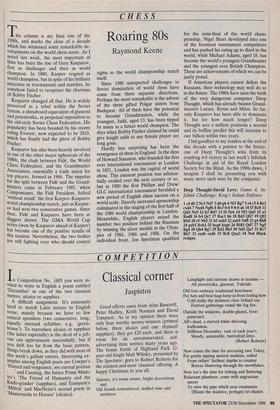CHESS
Roaring 80s
Raymond Keene
This column is my final one of the 1980s, and marks the close of a decade which has witnessed some remarkable de- velopments on the world chess scene. As I noted last week, the most important of thise has been the rise of Gary Kasparov, first as challenger and then as world champion. In 1980, Karpov reigned as world champion, but in spite of his brilliant successes in tournaments and matches, he somehow failed to recapture the charisma of Bobby Fischer. Kasparov changed all that. He is widely perceived as a rebel within the Soviet system, a chessboard equivalent of glasnost and perestroika, in perpetual opposition to the old-style Soviet Chess Federation. His popularity has been boosted by his recent rating Everest, now expected to be 2810, which has finally laid the ghost of Bobby Fischer.
Kasparov has also been heavily involved in one of the other major upheavals of the 1980s, the clash between Fide, the World Chess Federation, and the Grandmaster Association, essentially a trade union for top players, formed in 1986. The impetus for the split between Fide and the Grand- masters came in February 1985, when Campomanes, the Fide President, halted `without result' the first Karpov—Kasparov world championship match, just as Kaspar- ov had won two consecutive games. Since then, Fide and Kasparov have been at daggers drawn. The GMA World Cup series (won by Kasparov ahead of Karpov) has become one of the positive results of this tension. Nevertheless, the two bodies are still fighting over who should control rights to the world championship match itself.
Since 1980 unexpected challenges to Soviet domination of world chess have come from three separate directions. Perhaps the most remarkable is the advent of the three gifted Polgar sisters from Budapest. All of them have the potential to become Grandmasters, while the youngest, Judit, aged 13, has been tipped by many as a future world champion. The days when Bobby Fischer claimed he could give knight odds to any female player are long gone. Hardly less surprising has been the resurgence of chess in England. In the days of Howard Staunton, who founded the first ever international tournament at London in 1851, London was the capital of world chess. This eminent position was substan- tially eroded over the next century or so, but in 1980 the first Phillips and Drew/ GLC international tournament heralded a new period of English chess success on a world scale. Heavily increased sponsorship culminated in the staging of the first half of the 1986 world championship in London. Meanwhile, English players seized the number two position behind the Russians by winning the silver medals in the Olym- pics of 1984, 1986 and 1988. On the individual front, Jon Speelman qualified for the semi-final of the world cham- pionship, Nigel Short developed into one of the foremost tournament competitors and has pushed his rating up to third in the world, while Michael Adams, aged 18, has become the world's youngest Grandmaster and the youngest ever British Champion. These are achievements of which we can be justly proud.
If American players cannot defeat the Russians, their technology may well do so in the future. The 1980s have seen the birth of the very dangerous computer Deep Thought, which has already beaten Grand- masters Larsen, Byrne and Miles. So far, only Kasparov has been able to dominate it, but for how much longer? Deep Thought sees a million positions a second and its boffins predict this will increase to one billion within two years.
I bid goodbye to my readers at the end of this decade with a pointer to the future, one of Deep Thought's wins from its crushing 4-0 victory in last week's Infolink Challenge in aid of the Royal London Society for the Blind. As the 1990s dawn, I imagine I shall be presenting you with many more such wins by the computer: Deep Thought-David Levy: Game 4, In- folink Challenge; King's Indian Defence.
1 c4 d6 2 Nc3 Nd7 3 d4 g6 4 Nf3 Bg7 5 e4 c5 6 Be2 cxd4 7 Nxd4 Ngf6 8 Be3 0-0 9 0-0 a6 10 f3 Re8 11 Qd2 Ne5 12 h3 Bd7 13 f4 Nc6 14 Nf3 Qa5 15 a3 Rad8 16 b4 Qc7 17 Racl b6 18 Bd3 Qb7 19 Qt2 Rb8 20 e5 Nh5 21 b5 axb5 22 axb5 Nd8 23 g4 Bh8 24 gxh5 Bxh3 25 hxg6 hxg6 26 Rfdl Qd7 27 Ng5 Bg4 28 Qh4 Bg7 29 Rd2 Bh5 30 Nd5 Qa7 31 Rc7 Rb7 32 exd6 exd6 33 Rc8 Qxa3 34 Ne4 Black resigns.










































































































 Previous page
Previous page